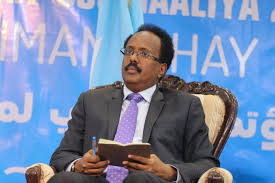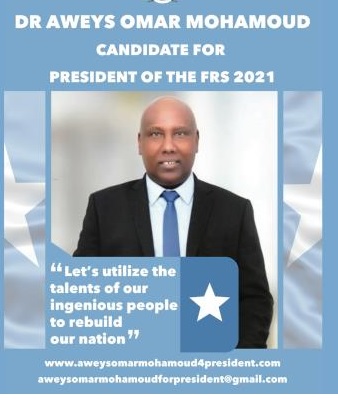By Dr Aweys Omar Mohamoud
This is my analysis of Part II and a miscellany of fascinating exchanges at this year’s Somalia Partnership Forum (SPF) which took place last Monday, 7th Dec. 2020, in Mogadishu.

The words of wisdom spoken by Suldaan Bayle and the speakers of ‘women in Mogadishu’ will fall on deaf ears. No surprise there! Most political opponents of President Farmaajo see him as a dictator in the making. I said as much in my first article about his leadership back in February 2020. I spent most of the first three years of his term in Mogadishu. Some people said at the time that his whole presidency was going to be a hollow sham. Yet what he lacked in substance was compensated for him by his ideology of despotism – the principle of complete and unrestricted power in government.
Almost from the moment he came into office, Mr. Farmaaja’s modus operandi has been to demand submission to his will, and to compel conformity to his authoritarian whims. He started dismantling core elements of the provisional constitution that stand in the way of threats of new dictatorship and repressive rule: the independence of parliament; the principles of the federal system enshrined in the constitution; a free press; and the rule of law. His weapons of choice are propaganda, terror, indoctrination and repression. The foregoing can be easily testified to by people of various political shades in Mogadishu.
There is one reality on the ground and there’s a distorted perception of reality by Mr. Farmaajo. The reality on the ground is that Mr. Farmaajo has not progressed state-building and peace-building in Somalia. On the contrary, he failed to deliver credible leadership to foster a sense of common national purpose. His distorted perception of reality is that he’s a beloved unifier. But the opposite is true and, sadly, he has not used his wannabe despotic authority to institute the much needed political and societal reforms that the county was crying out for when he took the helm back in early 2017. Instead, as all authoritarian leaders do, he has alienated significant sections of society through his policies.
What we see in the statements I transcribed, therefore, is a common rejection of Mr. Farmaaja’s policies which, if he’s not very careful, may quickly mutate into a popular revolt against his despotism. The mistake he’s making is that, because of the absence of effective political institutions, he has usurped unconstitutional powers to manipulate the electoral process using the legitimate and illegitimate advantages of his incumbency for the sole purpose of making it extremely difficult for his opponents to compete. The endgame, of course, is that the upcoming elections will not generate a transfer of power.
That much was alluded to by the very vocal DPM Mr Mahdi Guuleed who recently announced that the upcoming FGS presidential elections should yield results that are not dissimilar to the ones produced by his boss’s installation of compliant allies as presidents in the regional governments of South West state in December 2018 and Galmudug state in February 2020 and, last month, in Hirshabelle state. On the basis of this engineered trend, according to Guuleed, Mr. Farmaajo will be the strongest candidate and should easily win outright in the first round.
This gentleman’s analysis must be taken with a grain of salt. Last Monday, he amused attendees at the Somalia Partnership Forum (SPF) with what he thought was a clever wordplay, but ended up confusing the word consent which he defined as ‘having a good night with my wife’ with the concept of consensus-building in terms of reaching a broad-based agreement among political actors to chart a viable way forward to a free, fair, timely and transparent election.
It did not register in his mind that consensually ‘having a good night with my wife’ is in the private realm whereas consensus-building among political competitors in Somalia’s highly polarized context is in the public realm. The public realm is a realm of freedom where the free exchange of ideas and debate happens, and is the cornerstone of democracy. From this public realm grows a “public authority” that dictates the values, ideals, and goals of a given society. The will of the people is expressed within it and emerges out of it. As such, a public sphere is focused on common concerns and being inclusive, i.e., all can participate.
By contrast, the private sphere is the realm of the family and home life which, in theory, is free from the influence of government and other social institutions. It is in this realm that husbands take care of the needs for food, shelter, and ‘having a good night’ with their wives. One’s responsibility in this realm is to oneself and the other members of his/her household and whatever work and exchange take place within it is separate from the economy of the greater society.
The contribution of Ben Fender, British Ambassador to Somalia, was aptly relevant to where we are today as a nation. Mr. Fender cited from 17th century English philosopher Thomas Hobbes’s best known work in Leviathan: “For a nation to rise, to become great and prosperous, a sovereign force in the world, there must be what he called a social contract. People must agree to give up a little of their selfish interest to live by a set of rules, a constitution, for the benefit of the greater freedom of all. I read about that a long time ago, but I never really understood its full force until I came to Somalia …”.
Indeed, the political class in Somalia needs to pay close attention to the critical role of the social contract between government and society for peace and security. A broken social contract produces low social cohesion, and weak governing institutions all of which affect the economic, social, political, security, and physical infrastructure of society.
Returning to the subject of our article, Mr. Farmaajo is making a fundamental error of political misjudgement. When his hero Siyad Barre imposed a dictatorship on Somalia more than 5 decades ago, the Somali people lacked something that they could neither make for themselves nor obtain from abroad: this was a genuine political community.
Today, there are genuine political communities across the country, all endeavouring to create a government accountable to citizens, and citizens under government. These communities are in a pole position to utilize the vast reservoir of energy and potential untapped at the grassroots. It was their absence on any significant scale that left the country so cruelly exposed to the dictatorship of Siyad Barre some fifty plus years ago because of the passivity of the population.
But also, political power is no longer concentrated in Mogadishu to lord it over the rest of the country. Power is dispersed among the people through FMSs, not to mention the power centre at the sprawling international civilian and military camp in Halane. The FMSs have a growing organic nexus with their citizens and, the prominent among them, are mustering the capacity to build political communities who can create, re-create and abide by the existing principles of political obligation – ‘the moral duty of citizens to obey the laws of their state.’

There’s also an increasing organic nexus between these political communities and the growing educated class at home and abroad, and also between them and their brethren in the diaspora. Moreover, these communities are now almost entirely virtually connected, thanks to the decisive technology of the Information Age – the internet.
Get real, Mr. Farmaajo! You simply cannot set up a new dictatorship in Somalia, and your obstinate refusal to compromise will not stand in the face of new city-wide protests which, as we hear today, have already started in parts of the city.
Mogadishu-wide protests that started mid-December some thirty years ago got worse and worse and, having mutated into armed conflict, finally culminated in the overthrow of the regime of Siyad Barre and the collapse of the state. Their appearance again in Mogadishu at this moment of crisis is an omen of disaster.
If you have ears to hear and eyes to see, Mr. Farmaajo, please take note of these new developments in the city you’ve lorded over the past four years and do the decent thing and step down.
Dr Aweys Omar Mohamoud
For more info visit : Dr. Aweys’ Presidential Bid for 2021
We welcome the submission of all articles for possible publication on WardheerNews.com. WardheerNews will only consider articles sent exclusively. Please email your article today . Opinions expressed in this article are those of the author and do not necessarily reflect the views of WardheerNews.
WardheerNew’s tolerance platform is engaging with diversity of opinion, political ideology and self-expression. Tolerance is a necessary ingredient for creativity and civility.Tolerance fuels tenacity and audacity.
WardheerNews waxay tixgelin gaara siinaysaa maqaaladaha sida gaarka ah loogu soo diro ee aan lagu daabicin goobo kale. Maqaalkani wuxuu ka turjumayaa aragtida Qoraaga loomana fasiran karo tan WardheerNews.
Copyright © 2024 WardheerNews, All rights reserved


